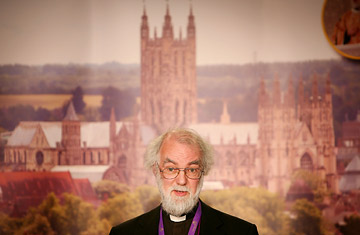
The Archbishop of Canterbury Dr. Rowan Williams
Last week, 670 bishops of the Anglican Communion returned from the Lambeth Conference outside London to their dioceses around the world, their faith fortified by 19 days of prayer and theological debate and buoyed by relief that the once-a-decade meeting had passed off with little public acrimony or mention of schisms.
But just days later, the patient efforts of Rowan Williams, the Archbishop of Canterbury and the man charged with holding the Anglican church together despite huge internal differences over the issue of gay clergy, lay in tatters following the leak of letters to the London Times newspaper that show where Williams' own sympathies lie on the matter.
In correspondence dating from 2000 and 2001 with Welsh psychiatrist and evangelical Christian, Deborah Pitt, Williams described how his literal faith in the scripture's prohibitions against homosexuality began to crumble after about 1980 and that 20 years of study and prayer had led him to the "definitive conclusion" that "an active sexual relationship between two people of the same sex might therefore reflect the love of God in a way comparable to marriage ..."
In itself, the revelation comes as no surprise to either liberal or conservative camps within the Anglican church. But Williams' previous writings on the subject have been few and couched in theologisms. This is how he tackled the issue in his essay The Body's Grace in 1989: "The absolute condemnation of same-sex relations of intimacy must rely either on an abstract fundamentalist deployment of a number of very ambiguous texts, or on a problematic and non-scriptural theory about natural complementarity, applied narrowly and crudely to physical differentiation without regard to psychological structures."
We can be thankful, at least, for his later brevity.
When he wrote his letter to Pitt, Williams was the Archbishop of Wales, his homeland and a diocese where he openly ordained gay priests. His appointment as Archbishop of Canterbury in 2003 was made in the full knowledge of that and liberals within the Church reasonably assumed that he would be the charismatic champion of the kind of church they longed for.
The realization that Williams would prioritize unity over change came when he balked at appointing as bishop the openly gay priest Jeffrey John. In this, Williams aimed to assuage the protests of a number of more traditional bishops. In a painful meeting, Williams persuaded John to withdraw his candidacy — an act that many liberals in the church saw not only as a capitulation but also as a missed opportunity to plant a flag for his true convictions. "Had he gone through with it," a gay vicar in Wales and a friend of Williams told TIME over 18 months ago, "We would not be where we're at. It would either have nailed the problem or it would have caused a split very quickly. He's delaying the inevitable."
An early indication of how he would manage the discrepancy between his views and the requirements of his high office come in the leaked letters. "I don't see myself as a campaigner for a new morality," Williams writes in a letter of September 2000, "but if I'm asked for my views, as a theologian rather than as a church leader, I have to be honest and admit that they are as I've said". But the logic of his position unravels when he notes that the church has "shifted its stance on several matters, notably the rightness of lending money at interest and the moral admissibility of contraception, so I am bound to ask if [homosexuality]is another such issue." Change can be slow, but it is never won by sitting on high, uncomfortable fences.
